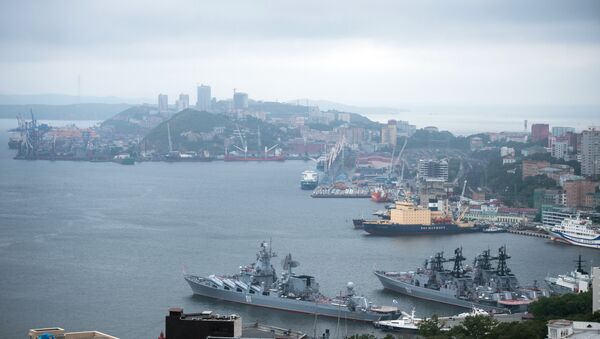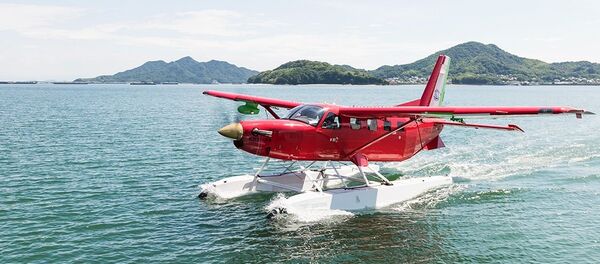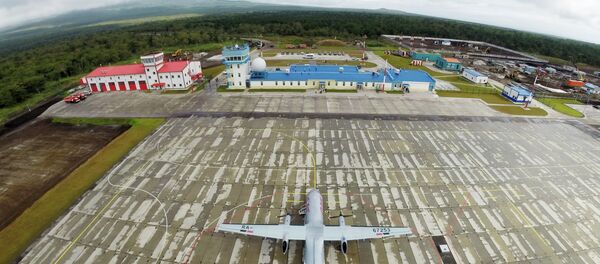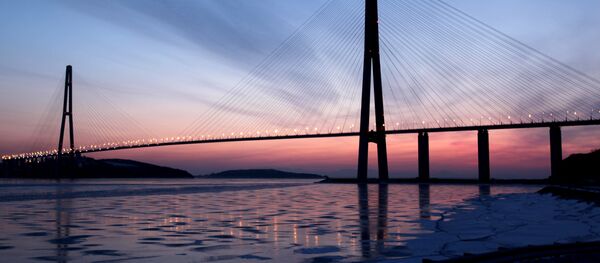While the business environment in Russia is gradually improving, Japanese investments in Russian Far East projects is extremely small, Teruo Asada, the chairman of the Japan-Russia Business Cooperation Committee of Keidanren, told Sputnik Japan.
"Only three Japanese companies use the Free Port of Vladivostok," Asada pointed out. "Could it be explained by the fact that Japanese entrepreneurs do not fully understand the significance and benefits of using this special economic zone? To develop large projects in the future, it is necessary to explain to the Japanese partners the benefits of the use of Russian special economic zones."
Answering the question why are Japanese entrepreneurs hesitant about kicking off large infrastructural projects in the region, Asada referred to Marubeni's innovative Abu Dabi solar power plant project.
Marubeni, a major Japanese investment business conglomerate, struck a deal offering an incredibly low price for electricity — 2.5 cents per kilowatt. "Such projects are necessary for Japan and Russia in order to expand cooperation in the field of investment and business," the Japanese businessman suggested.
Meanwhile, China, South Korea and the countries of Asia-Pacific region have already jumped on the bandwagon of the Russian Far East endeavors. Over the past three years the Russian Far East has attracted investments amounting to $55 billion, including $5 billion from the Asia-Pacific states.
On December 15 the Advanced Development Territories (ADT) project was kicked off on the island of Shikotan, belonging to the Kuril archipelago. Russian fish factory "Ostrovnoy" is planning to build four fish processing plants there. Meanwhile, for the first time December 18 was announced as the Day of the Japanese Investor in Vladivostok.
"We've held a lot of meetings with the Japanese side," Krutikov told Sputnik. "However, these negotiations didn't result in decisions. In contrast to other countries, there are only a few Japanese investors in the Russian Far East. This amounts to just 0.02 percent of total investments in ADTs and the Free Port [of Vladivostok]."

Krutikov noted that investors from 14 countries have been attracted by preferences and benefits offered within the framework of Russia's ADT project in the region.
"Like their Japanese counterparts these businessmen have calculated their [potential] benefits and risks," the Russian official said. "I don't think that the absence of a Russo-Japanese peace treaty and Japan's adherence to anti-Russian sanctions is an obstacle to cooperation [between the countries]."
The deputy minister stressed that the representations of the Agency of the Far East are being opened in Japan, South Korea, China and India with the task of attracting investments and export supporting.
"At present the [agency's] headquarters has already been opened in Beijing. Next year offices in Harbin and Shanghai will start working — there is substantial business activity of local companies [in these regions]. In the first half of 2018 representation offices are due to be opened in Tokyo and Seoul," Krutikov elaborated.
The official explained that the main task of the agency's headquarters abroad is to attract as many foreign investors to the Far East as possible. He highlighted that new projects and new investors is the agency's major priority: "For us it is important to work directly with businesses in these countries."
The law on ADT was signed in December 2014 and came into force in spring 2015. In October 2015 the Free Port of Vladivostok — a zone under a special custom and taxation system — was established, which comprises the city of Vladivostok and a number of Primorsky Territory ports and municipalities. In this region companies with resident status enjoy tax benefits, simplified bureaucratic procedures and visa regime liberalization.
The views and opinions expressed by Teruo Asada, Alexander Krutikov are those of the speakers and do not necessarily reflect those of Sputnik.





